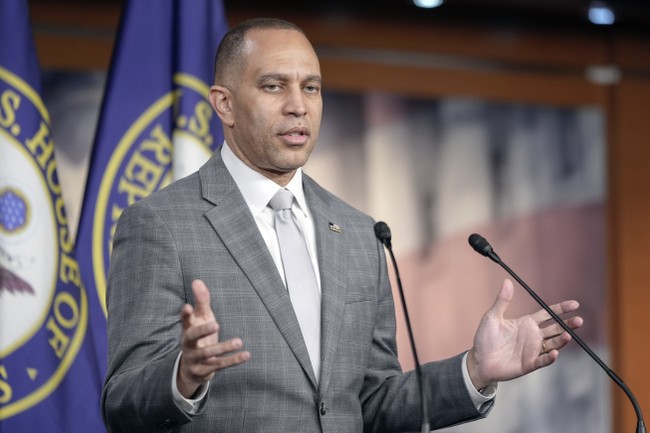ARTICLE AD BOX
LONDON — Andy Street was once a success story for the Conservatives — now he wants less and less to do with them.
The 60-year-old former department store manager was elected the first mayor of the West Midlands in 2016 and went on to win re-election by a wider margin in 2021.
He’s been hailed as a model for Conservatives in devolved government to copy, winning plaudits and votes for vocally putting regional needs first and foremost.
But as voters go to the polls across England and Wales Thursday, Street’s hardly shouting from the rooftops about Prime Minister Rishi Sunak’s Conservative government.
And, with the Tories currently tanking in national polls, Conservative candidates across the board appear to be looking to Street for inspiration on bucking the trend.
Streets ahead
Street’s supporters say he’s always been strongly independent of central government — arguing forcefully for the controversial High Speed 2 rail line as it came under threat and against what he calls a “begging bowl culture” in which regional leaders must always appeal to Westminster for money.
Putting personal brand first appears to be a feature of the modern mayoral model, with Greater Manchester’s Andy Burnham and London’s Sadiq Khan also no strangers to tension with their own Labour leadership.
 Andy Street visits the construction site of a Birmingham High Speed 2 rail station. | Christopher Furlong/Getty Images
Andy Street visits the construction site of a Birmingham High Speed 2 rail station. | Christopher Furlong/Getty ImagesBut the trend seems to have accelerated as Street faces his toughest fight yet. The mayor appears less and less willing to champion the merits of Sunak’s beleaguered Tory team in London.
His slogan “lots done, more to do” is picked out in very un-Conservative green and purple rather than Tory blue. Street’s Twitter and Instagram feeds do not mention his party affiliation upfront.
Challenged to express enthusiasm for Sunak, Street recently told the Sunday Times: “He is the prime minister. I am supportive to the party. But he and I have fallen out over a number of issues.”
Street’s Labour rival, Richard Parker, has accused him of being a Tory “when it suits him.”
A Conservative MP in the West Midlands, granted anonymity like others in this article to speak freely, conceded that while some might see Street’s actions as an exercise in political distancing, “Andy has taught me a lesson, which is don’t ram Conservative posters down people’s throats.”
“We should make the effort to explain why you should vote for me. Not just because I’ve got a blue ribbon but because I care about the things that you care about,” the MP added.
Clear blue water
In hard-fought elections around the country, the temptation to take a leaf out of Street’s book appears strong.
Ben Houchen, mayor of Tees Valley since 2017, has dropped the Conservative label from some leaflets and has boasted that he is used to hearing from voters that they would back him despite not liking the Tories.
Keane Duncan, Conservative candidate for the North Yorkshire mayoralty, has eschewed any mention of prominent local MP Rishi Sunak on his campaign page.
Adam Hawksbee, deputy director of right-leaning think tank Onward and a former aide to Street, defended the approach taken by Tory mayoral candidates, insisting: “People are voting based on what they want their metro mayor to be doing, not focusing on what they think of parties in Westminster.”
The Labour Party on the other hand has been scathing. One Labour official remarked that Sunak “has staked his future on the fate of two mayors who want nothing to do with his toxic brand.”
 Sunak speaks to apprentices during a visit to a wind tech factory in Redcar. | Pool photo by Ian Forsyth via Getty Images
Sunak speaks to apprentices during a visit to a wind tech factory in Redcar. | Pool photo by Ian Forsyth via Getty ImagesMeanwhile, voters across the country are getting used to receiving leaflets from the Conservatives for both the local elections and the forthcoming general election decked out in bright green or even red — the traditional color of their Labour rivals — where it is necessary to squint hard to make out any mention of the governing party.
Swanage Tories went one further and sent out a pamphlet saying they were “angry and frustrated” at aspects of government conduct and “we don’t feel we should be held responsible for what goes on at and around Westminster.”
A Conservative Party spokesperson said: “Local Conservatives are talking about what they have delivered locally or the issues that need tackling in their area.”
Yet one attendee at a meet and greet for parliamentary candidates with Defense Secretary Grant Shapps last week said there was a strong sense in the room that those present were “fed up” with trying to defend the party in the wake of a series of scandals involving Tory MPs.
“A lot of us are now just trying to work out how to distance ourselves from the indefensible and make this about me,” the candidate said.
Stefan Boscia and Emilio Casalicchio contributed reporting.
.png)
 9 months ago
5
9 months ago
5








 English (US)
English (US)